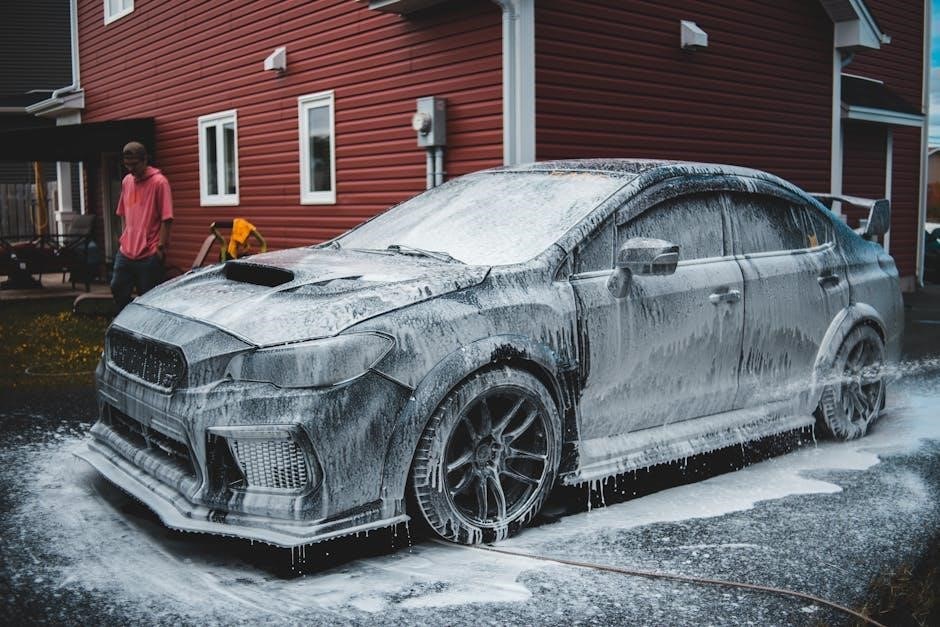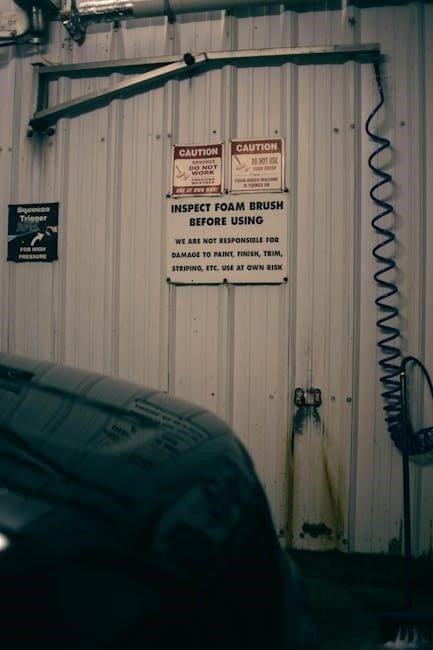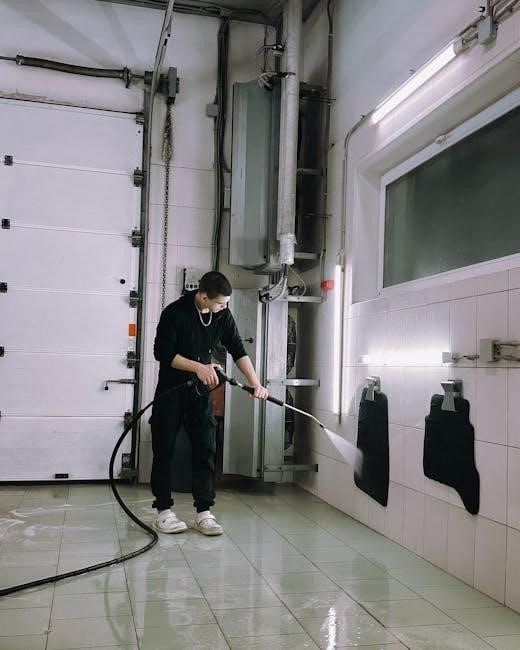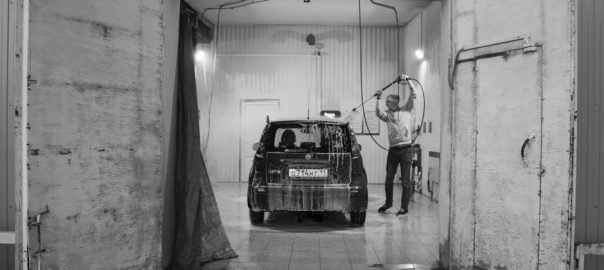Car wash equipment encompasses tools and machinery essential for effectively cleaning vehicles, ensuring efficiency and quality in commercial or self-service operations.
From pressure washers to drying systems, this equipment plays a crucial role in maintaining vehicle appearance and protecting environmental resources through water conservation techniques.
1.1 Overview of Car Wash Equipment
Car wash equipment includes a variety of tools designed to streamline and enhance the cleaning process. From pressure washers and vacuum cleaners to brushes, scrubbers, and drying systems, these devices ensure thorough vehicle cleaning. Equipment ranges from manual, semi-automatic, to fully automatic solutions, catering to different needs and scales of operations. Properly selected equipment not only improves efficiency but also helps conserve water and energy, making car wash businesses more sustainable and environmentally friendly.
1.2 Importance of Proper Equipment in Car Washing
Proper car wash equipment is vital for achieving a spotless finish, protecting vehicle surfaces, and ensuring customer satisfaction. High-quality equipment ensures efficient cleaning, reduces water and energy consumption, and minimizes environmental impact. Additionally, it enhances safety by preventing damage to vehicles and injuries to operators. Investing in the right tools not only boosts operational efficiency but also supports long-term business sustainability and profitability in the car wash industry.

Types of Car Wash Equipment
Car wash equipment is categorized into automatic, semi-automatic, and manual systems, each designed for different needs and operational scales, ensuring efficient and effective cleaning solutions.
2.1 Automatic Car Wash Equipment
Automatic car wash equipment uses advanced technology to streamline the cleaning process, minimizing human intervention. These systems often include tunnel washes, conveyor belts, and robotic arms for thorough cleaning. They are ideal for high-volume operations, offering efficiency and consistency. Key components include spray nozzles, brushes, and drying systems. Energy and water efficiency are prioritized in modern designs. Regular maintenance ensures optimal performance and longevity. This setup is popular in commercial settings due to its speed and reliability, making it a preferred choice for car wash businesses aiming to serve a large customer base effectively.
2.2 Semi-Automatic Car Wash Equipment
Semi-automatic car wash equipment combines manual operation with automated features, offering flexibility and cost-effectiveness. This setup typically includes pressure washers, spray nozzles, and timers for controlled cleaning. Operators can adjust settings, making it ideal for smaller or specialized car wash businesses. Semi-automatic systems are easier to install and maintain compared to fully automatic setups, providing a balance between efficiency and manual oversight. They are widely used in medium-scale operations where customization and affordability are prioritized.
2.3 Manual Car Wash Equipment
Manual car wash equipment relies on human effort, making it a cost-effective option for small-scale or mobile operations. Tools like buckets, hoses, brushes, and squeegees are essential. Microfiber cloths and scrubbers are used for thorough cleaning without automated assistance. Detergents and cleaning solutions are manually applied, offering control over the washing process. This method is ideal for detailing services or locations with limited resources, emphasizing personalized care and affordability. It remains a popular choice for its simplicity and low initial investment requirements.

Essential Equipment for Car Wash Setup
Pressure washers, vacuum cleaners, drying equipment, brushes, detergents, and water recycling systems are vital for efficient car washing, ensuring quality results and environmental sustainability.
3.1 Pressure Washers
Pressure washers are indispensable in car wash setups, delivering high-pressure water jets to remove dirt, grime, and stains efficiently. They come in various types, including electric, gas, and diesel models, catering to different needs and scales of operations. Regular maintenance, such as checking hoses and nozzles, ensures optimal performance. Proper usage involves adjusting pressure settings to avoid damage to vehicle surfaces. Eco-friendly options with lower water consumption are increasingly popular, aligning with sustainability goals. Investing in a quality pressure washer enhances cleaning effectiveness and prolongs equipment lifespan.
3.2 Vacuum Cleaners
Vacuum cleaners are essential for interior car cleaning, efficiently removing dust, dirt, and debris from upholstery, carpets, and crevices. Commercial-grade models are designed for heavy use, offering powerful suction and durability. Wet/dry vacuums are ideal for handling spills and deep cleaning, while backpack vacuums provide mobility for detailed work. Regular maintenance, such as filter cleaning and hose inspection, ensures optimal performance. Investing in a reliable vacuum enhances cleaning efficiency and customer satisfaction, making it a vital tool for any car wash setup.
3.3 Drying Equipment
Drying equipment is crucial for removing water from vehicles after washing, preventing spots and ensuring a polished finish. Air blowers and microfiber towels are popular choices, with blowers offering efficient water removal from tight spaces. Advanced systems, like heated blowers, enhance evaporation for faster drying. Regular maintenance, such as cleaning filters and ensuring proper airflow, is essential for optimal performance. Drying equipment not only improves results but also reduces drying time, making it a key component in modern car wash operations.
3.4 Brushes and Scrubbers
Brushes and scrubbers are essential tools for effectively removing dirt, grime, and stubborn stains from vehicle surfaces. Soft-bristle brushes are ideal for delicate exterior surfaces, while stiffer scrubbers are better suited for tires, wheels, and heavy-duty cleaning. These tools are typically made from durable materials like nylon or polyester, ensuring longevity. Regular maintenance, such as cleaning and replacing worn bristles, is crucial for optimal performance. Brushes and scrubbers play a vital role in achieving a spotless finish and protecting vehicle surfaces from damage during the washing process.
3.5 Detergents and Chemicals
Detergents and chemicals are vital for effectively removing dirt, grime, and contaminants from vehicles. They are specifically formulated to target different surfaces, such as paint, glass, and wheels, ensuring a safe and thorough cleaning process. pH-balanced detergents are commonly used to avoid damage to vehicle finishes, while degreasers and wheel cleaners tackle tough stains and brake dust. Proper use of these chemicals is essential to maintain vehicle integrity and achieve a superior shine.
Regularly updating and selecting the right detergents ensures optimal cleaning results and environmental safety. Always follow dilution ratios and safety guidelines to avoid damage or hazardous waste.
3.6 Water Recycling Systems
Water recycling systems are essential for eco-friendly car wash operations, reducing water consumption and operating costs. These systems collect, treat, and reuse water from the washing process, minimizing environmental impact. Advanced filtration technologies remove dirt, oils, and contaminants, ensuring the recycled water meets quality standards for reuse. Implementing such systems not only conserves resources but also complies with environmental regulations, making them a sustainable choice for modern car wash businesses.
Regular maintenance of recycling systems is crucial to ensure efficiency and prevent contamination, safeguarding both the environment and operational efficiency.
Advanced Car Wash Equipment
Advanced car wash equipment includes touchless systems, tunnel washes, and conveyor belts, offering efficient, automated solutions that enhance cleaning quality and reduce labor costs.
4.1 Touchless Car Wash Systems
Touchless car wash systems utilize high-pressure jets and advanced sensors to clean vehicles without physical contact, reducing damage risks and improving efficiency.
These systems often include automated arms or spray nozzles that adjust based on vehicle size and shape, ensuring thorough cleaning while conserving water and energy.
They are ideal for modern car wash businesses, offering faster cycle times, lower labor costs, and a gentler approach to cleaning sensitive vehicle surfaces.
Touchless systems also reduce the risk of scratches and paint damage, making them a popular choice for customers seeking a safe and effective wash experience.
4.2 Tunnel Wash Systems
Tunnel wash systems are large, enclosed structures where vehicles pass through on a conveyor belt, undergoing a multi-stage cleaning process.
These systems typically include pre-soak sprayers, brushes, high-pressure jets, and drying units, offering a comprehensive wash experience.
They are highly efficient, suitable for high-volume operations, and often incorporate water recycling and energy-saving technologies.
Tunnel washes are popular in commercial settings due to their speed and ability to handle various vehicle sizes while maintaining consistent cleaning quality.
They also reduce labor costs and environmental impact compared to traditional methods.
4.3 Conveyor Belt Systems
Conveyor belt systems are integral to modern car wash operations, automatically moving vehicles through the wash process with precision and efficiency.
These systems eliminate manual vehicle positioning, reducing labor and minimizing damage risks from improper alignment.
They are typically used in tunnel and express washes, ensuring a smooth, continuous flow of vehicles through various cleaning stages.
Conveyor belts are durable, designed to handle heavy use, and come with safety features to prevent accidents.
Regular maintenance is essential to ensure optimal performance and extend the system’s lifespan.
4.4 Spray Nozzles and Jets
Spray nozzles and jets are critical components in car wash systems, delivering high-pressure water streams to remove dirt and debris efficiently.
Available in various types, including fixed and adjustable models, they ensure precise water distribution for optimal cleaning performance.
Advanced nozzles often feature anti-clogging designs and durable materials to withstand frequent use and harsh chemicals.
Properly maintained nozzles help conserve water and energy while ensuring a thorough wash, making them essential for both commercial and self-service car washes.
4.5 Air Blowers and Dryers
Air blowers and dryers are essential for efficiently removing water from vehicles after washing, reducing drying time and preventing water spots.
These systems use high-velocity air streams to force water off surfaces, ensuring a spot-free finish and protecting paint and exterior components.
Advanced models often feature adjustable speed settings and energy-efficient designs, making them suitable for both small-scale and large commercial operations.
Regular maintenance, such as cleaning filters and inspecting hoses, is crucial to ensure optimal performance and longevity of the equipment.
Additional Accessories for Car Wash
Accessories like microfiber towels, brushes, and cleaning solutions enhance efficiency and detailing quality, ensuring a thorough and professional car wash experience.
5.1 Hose Reels and Sprayers
Hose reels and sprayers are essential for efficient water distribution in car washing. They ensure tidy storage and easy access to water, preventing tangling and damage.
- Durable materials like stainless steel or heavy-duty plastic ensure longevity.
- Retractable designs save space and improve workflow.
- Adjustable spray nozzles allow for tailored water pressure and flow.
- Mounted or portable options cater to different car wash setups.
These accessories enhance convenience and productivity, making them a must-have for both manual and automatic car wash operations.
5.2 Cleaning Solutions and Dispensers
Cleaning solutions and dispensers are vital for effective car washing, ensuring the right chemicals are applied efficiently. They come in various formulations, such as pre-soak, wheel cleaners, and drying agents, tailored for specific cleaning tasks.
- Dispensers are designed for precise application, reducing waste and optimizing cleaning power.
- Wall-mounted or portable options suit different car wash setups.
- Proper dilution and application ensure safety for vehicles and the environment.
High-quality solutions and dispensers enhance cleaning results while maintaining equipment longevity.
5.3 Microfiber Towels and Cloths
Microfiber towels and cloths are essential for drying and detailing vehicles, offering superior absorbency and softness to prevent scratches. Available in various sizes and thicknesses, they are reusable and durable, making them a cost-effective option for car washes.
- Standard microfiber towels are ideal for general drying and cleaning.
- Plush microfiber cloths are gentler for delicate surfaces like paint and glass.
- They can be washed and reused multiple times, reducing waste and saving money.
Microfiber products are a must-have for achieving a spotless finish in car washing operations.
5.4 Tire Cleaning Equipment
Tire cleaning equipment is vital for removing dirt, grime, and brake dust from wheels and tires, enhancing both appearance and safety. Essential tools include:
- Wheel brushes for scrubbing hard-to-reach areas.
- Tire scrubbers for deep cleaning sidewalls and treads.
- High-pressure washers for rinsing away stubborn dirt.
These tools ensure thorough cleaning, preventing damage and maintaining the vehicle’s overall look. Regular use of tire cleaning equipment is crucial for a professional car wash service.
5.5 Wheel and Rim Cleaning Tools
Wheel and rim cleaning tools are essential for removing brake dust, grime, and tar from wheels, ensuring a spotless finish. Key tools include:
- Wheel brushes with soft or stiff bristles for gentle or deep cleaning.
- Wheel acid or alkaline-based cleaners for tough stains.
- Scrubbers for rims and alloy wheels.
- High-pressure sprayers for rinsing.
Regular use of these tools prevents corrosion and enhances the vehicle’s appearance, making them a must-have for professional car wash services.

Choosing the Right Equipment for Your Car Wash
Assess your car wash needs, budget, and space to select equipment that ensures efficiency, durability, and meets customer expectations for a superior cleaning experience.
6.1 Factors to Consider When Selecting Equipment
When selecting car wash equipment, consider factors like water pressure, energy efficiency, and durability to ensure long-term performance and cost savings. Additionally, assess the space and layout of your car wash to choose equipment that fits seamlessly. Budget constraints and maintenance requirements should also be evaluated to make an informed decision. Prioritizing customer satisfaction and environmental impact can further guide your choices. Finally, ensure compatibility with existing systems and future scalability for business growth. Proper selection ensures optimal functionality and customer satisfaction.
6.2 Budget and Cost Analysis
Establishing a budget is crucial when selecting car wash equipment. Consider both initial investment and long-term operating costs, such as water, energy, and maintenance. Prioritize equipment that balances affordability with durability and efficiency. Additionally, evaluate potential return on investment by comparing equipment costs to expected revenue. Budgeting tools or financial calculators can help estimate expenses and plan for future upgrades. Always allocate funds for unexpected repairs to ensure smooth operations. A well-planned budget ensures sustainability and profitability for your car wash business. Proper financial planning is essential for success.
6.3 Space and Layout Considerations
When setting up a car wash, space and layout are critical factors. Ensure equipment fits comfortably, allowing easy movement for vehicles and staff. Optimize the layout to streamline the washing process, reducing bottlenecks. Consider the size of machinery, such as tunnel systems or conveyor belts, and how they integrate into your available space. Proper placement enhances efficiency and customer experience. Additionally, plan for future expansion by leaving room for potential upgrades or additional equipment. A well-designed layout maximizes productivity and ensures smooth operations.
6.4 Water and Energy Efficiency
Water and energy efficiency are crucial for sustainable car wash operations. Invest in equipment with low-flow nozzles and water recycling systems to minimize water usage. Energy-efficient pumps and LED lighting can significantly reduce power consumption. These eco-friendly solutions not only lower operational costs but also appeal to environmentally conscious customers.
Modern car wash equipment often includes features designed to optimize resource use. By prioritizing efficiency, businesses can reduce their environmental impact while maintaining high-quality service. This approach supports long-term sustainability and cost savings.

Maintenance and Upkeep of Car Wash Equipment
Regular maintenance is vital to ensure car wash equipment functions efficiently and lasts longer. Schedule routine checks and clean machinery to prevent breakdowns and optimize performance.
Inspect and replace worn parts, lubricate moving components, and ensure proper water and chemical flow. Prompt repairs and professional servicing can prevent costly downtimes and extend equipment lifespan.
7.1 Regular Maintenance Tips
Regular maintenance ensures car wash equipment operates effectively and prolongs its lifespan. Start by inspecting hoses, nozzles, and seals for wear or damage, replacing them as needed.
Lubricate moving parts periodically to reduce friction and prevent mechanical failures. Clean filters and spray nozzles to maintain water flow efficiency and avoid clogs.
Check electrical components for proper connections and inspect pressure washers for optimal pressure settings. Schedule professional servicing annually to address complex issues early.
Keep a maintenance log to track repairs and replacements, ensuring consistency and accountability. Regular upkeep prevents unexpected breakdowns and keeps your car wash running smoothly.
7.2 Troubleshooting Common Issues
Identify and resolve common car wash equipment issues promptly to minimize downtime. Low water pressure may indicate clogged nozzles or faulty pumps, while electrical faults could stem from loose connections or tripped breakers.
Inspect hoses for kinks or blockages if water flow is restricted. For malfunctioning brushes, check for tangled bristles or worn motors. Regularly clean debris from spray nozzles to ensure proper function.
Address error codes on automated systems by consulting the user manual or contacting a technician. Keep spare parts on hand to quickly replace worn components, ensuring smooth operation.
7;3 Replacement and Repair Guidelines
Replace or repair car wash equipment promptly to maintain efficiency and safety. Always use genuine parts to ensure compatibility and longevity. Regularly inspect hoses, seals, and belts for wear, replacing them before they fail. For complex systems, consult professional technicians to avoid further damage. Keep a maintenance log to track replacements and repairs, ensuring compliance with manufacturer guidelines. Schedule routine checks to identify potential issues early, reducing downtime and extending equipment lifespan. Proper care ensures optimal performance and minimizes operational disruptions.

Safety Precautions for Car Wash Equipment
Ensure operator safety by following equipment manuals, wearing protective gear, and maintaining a clean workspace to prevent accidents and injuries during car washing operations.
8.1 Proper Usage and Handling
Proper usage and handling of car wash equipment are vital to ensure safety and efficiency. Operators must follow manufacturer guidelines and wear protective gear like gloves and goggles. Regular training on equipment operation reduces risks of accidents. Improper handling can lead to equipment damage or injury, emphasizing the need for adherence to safety protocols. Additionally, maintaining a clean workspace and ensuring all equipment is in good working condition further minimizes hazards. Always refer to the equipment manual for specific instructions.
8.2 Safety Measures for Operators
Safety measures for car wash operators are essential to prevent injuries and ensure a secure working environment. Operators should wear protective gear, including gloves, safety glasses, and closed-toe shoes. Proper training on equipment operation and emergency procedures is crucial. Regular equipment inspections help identify potential hazards, while maintaining a clean and organized workspace reduces tripping risks. Ensuring good ventilation, especially when using chemicals, prevents respiratory issues. Adhering to these safety measures promotes a safe and efficient car wash operation.
8.3 Emergency Procedures
Establishing clear emergency procedures is vital for car wash operations to handle unexpected incidents safely and efficiently. Operators should maintain a first aid kit, fire extinguisher, and emergency contact list. In case of equipment failure, immediately shut off power and evacuate the area. Chemical spills require containment and neutralization using appropriate materials. Train employees on emergency protocols, including evacuation routes and communication methods. Regular drills ensure preparedness, minimizing risks during crises. Having a well-planned emergency response system protects both staff and customers, ensuring quick resolution and safety.
Environmental Considerations
Car wash operations must adopt eco-friendly practices to minimize environmental impact, including water recycling, biodegradable detergents, and energy-efficient equipment to promote sustainability and responsible resource management.
9.1 Water Conservation Techniques
Water conservation is crucial in car wash operations to minimize environmental impact. Techniques include using low-flow nozzles, pressure washers with efficient flow rates, and water recycling systems.
Modern equipment often features dripless or water-reclamation technology, reducing wastewater and preserving this valuable resource. Implementing these methods not only supports sustainability but also lowers operational costs.
Adopting advanced water-saving technologies ensures eco-friendly practices while maintaining cleaning efficiency, making car wash businesses more environmentally responsible and cost-effective.
9.2 Chemical Usage and Disposal
Proper chemical usage and disposal are essential for eco-friendly car wash operations. Use biodegradable detergents and follow recommended dilution ratios to minimize environmental harm.
Dispose of chemical waste through designated systems or recycling programs to prevent contamination of waterways. Regular training for staff ensures safe handling and application of cleaning agents.
Adhering to local regulations and adopting green technologies helps reduce the ecological footprint of car wash businesses while maintaining cleaning effectiveness.
9.3 Energy Efficiency Practices
Implementing energy-efficient practices in car wash operations reduces costs and environmental impact. LED lighting and energy-saving pumps are effective solutions for minimizing power consumption.
Using advanced equipment with low-energy modes and optimizing heating systems can significantly lower energy usage. Regular maintenance ensures machinery operates at peak efficiency.
Adopting solar-powered systems or investing in Energy Star-certified equipment further supports sustainability goals, promoting a greener and more cost-effective car wash business model.
10.1 Summary of Key Equipment
The essential car wash equipment includes pressure washers, vacuum cleaners, drying equipment, brushes, detergents, and water recycling systems. These tools ensure efficient and effective cleaning, protecting vehicles and the environment. Pressure washers deliver powerful jets for tough dirt, while vacuums handle interiors. Drying equipment prevents water spots, and brushes gently scrub surfaces. Detergents enhance cleaning power, and water recycling systems promote sustainability. Together, these components form a comprehensive setup for professional car washing, ensuring quality results and customer satisfaction.
10.2 Final Thoughts on Car Wash Equipment
Investing in high-quality car wash equipment is essential for efficiency, customer satisfaction, and environmental sustainability. Regular maintenance ensures longevity and optimal performance, while eco-friendly practices enhance your business’s reputation. By selecting the right tools and adhering to best practices, you can streamline operations and deliver exceptional results. Staying updated with industry advancements will help your car wash business thrive in a competitive market, ensuring long-term success and customer loyalty.
